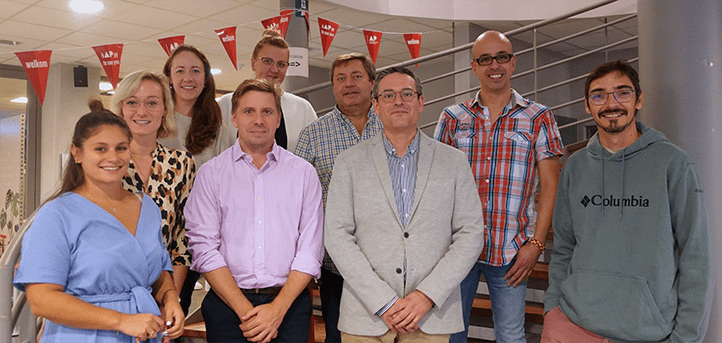The partners of the Erasmus Plus Digital Lab for Education in Dietetics combining Experiential Learning and Community Service project (E+DIETing_LAB), led by the Universidad Europea del Atlántico (European University of the Atlantic) (UNEATLANTICO), met on September 28 and 29 at the AP Hogeschool Antwerpen in Antwerp (Belgium) in order to refine the prototype of the digital self-learning platform, which corresponds to the first result of the project.
Together with UNEATLANTICO, the following European institutions also participate in the project: the University of Valladolid (UVA) in Spain, St. Pölten University in Austria, the Universidade do Porto in Portugal, AP Hogeschool Antwerpen in Belgium and, Jan Kochanowski University (UJK) in Poland.
During the conference, the partners focused on implementing improvements in the first output: an experiential learning platform with a virtual patient where the student has to guess the patient’s pathology and dietetic-nutritional problems. The same tool will be useful for dietitians who want to improve their skills.
This platform will integrate five different bots in five languages. The bot teaches the nutrition and dietetics student to perform a clinical screening process in an online/interactive manner. These bots provide the following cases: Gastroenterology, Diabetes mellitus type 1, cardiovascular disease and diabetes, obesity, and kidney disease. Each bot will have a questionnaire related to the field of nutrition and a final survey to know the user experience.
The partners noticed some bugs in the bots after testing them with students and faculty at their institutions. It is expected that, after internal testing, pilot activities with students will begin next December. During the transnational meeting, Kilian Tutusaus, professor at UNEATLANTICO, made a presentation of the second intellectual product to be developed, a virtual clinic, where a student will be able to interact with a real patient, supervised by a professor in this case. Finally, the partners discussed the organization of future multiplier events to inform the target audience about the progress of the project. Aspects related to communication and financial management were also discussed.
The project, which started last year, is funded by the Spanish Service for the Internationalization of Education (SEPIE, Spanish Agency of the European Program Erasmus +). It aims to improve practical training in dietetic education and promote a community/service learning approach related to nutrition and healthy habits as a social responsibility of the university.
The partners recently released a new project newsletter, which is available at the following link. Those interested in more information about this project can consult its website or social networks.
*Legal disclaimer: This project has been funded with support from the European Commission. This publication (communication) reflects the views only of the author. The Commission cannot be held responsible for any use which may be made of the information contained therein.


